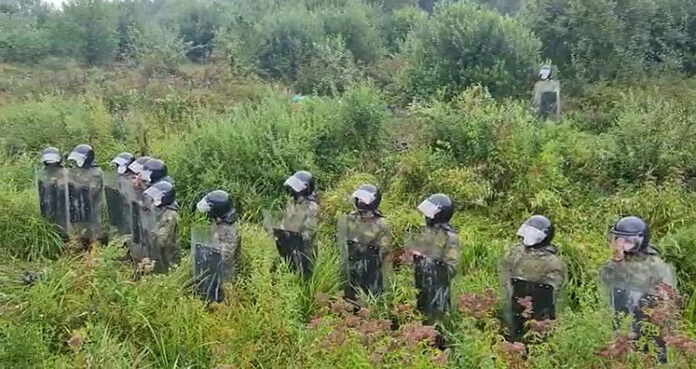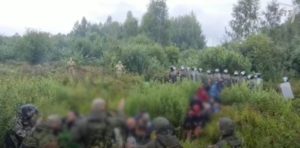
After EU Commissioner Ylva Johansson visited the Lithuanian-Belarusian border in early August, Vilnius announced it would be stopping migrants crossing from Belarus, indicating a shift toward the generally controversial practice of pushbacks. Lithuanian officials say that, amid what constitutes “hybrid aggression” from Belarus and crossings en masse, the measures are justified. Human rights bodies and observers have hinted Lithuania is walking on “thin ice” of international law by turning migrants back and diverting them to border posts and diplomatic representations, where they can ask for asylum. The Armed Forces will also be given enforcement authority at the border, including the use of force.
According to the Red Cross, it’s important for Lithuania to remain the country that carries “the flag of human rights”. Now, migrants are left in an information vacuum, with frustrations already boiling over into protests and an alleged suicide attempt. The regime of Alexander Lukashenko has been all too happy to use the alleged “hypocrisy” in Lithuania’s human rights advocacy in Belarus to white-wash its own image.
Videos have surfaced on social media showing Russian-speaking people behind the camera asking whether “firearms” were used against the returned migrants. These outtakes preceded a video allegedly showing migrants running from gunfire on the Lithuanian side. The alleged killing of an Iraqi national in Belarus is more disturbing. Minsk claimed he had died from sustained injuries and Lukashenko himself called for an investigation. Lithuanian officials dismissed the incident as a “provocation”. The Iraqi Foreign Ministry warned the country’s nationals not to fall victim to human trafficking.
With tensions seemingly escalating – and the Lithuanian officers barring journalists from the border for the time being – Defence Minister Arvydas Anušauskas has said the country hopes to avoid “armed provocations”. Lithuania has published what seems to be the first video proof of Belarusian authorities guiding and escorting the migrants. Another photo also appears to show people in uniform taking down barbed wire from the Belarusian side of the border.
Diplomatic efforts on behalf of the EU bloc may be beginning to pay off, as the first flight from Iraq to Belarus – the main source of irregular migration to Lithuania – has been cancelled. This comes after Lithuanian President Gitanas Nausėda said Brussels will press Iraq to act. Nausėda is also due to meet his Turkish counterpart Recep Tayyip Erdoğan for talks on stemming migration to Lithuania.
On August 17, Belarusian officers armed with shields and riot gear forcibly pushed a group of 35 irregular migrants into Lithuania and then entered the country’s territory, according to a press release by the Interior Ministry. Lithuania’s State Border Guard Service (VSAT) also shared a video of the incident on Facebook on Tuesday afternoon. It said that Belarus first published the footage, but omitted the part where the officers can be seen in Lithuanian territory. “Belarusian officers wearing riot gear were the ones who were pushing migrants from Belarus into Lithuania’s territory, and they later themselves illegally crossed Lithuania’s state border,” VSAT said. “Following repeated warnings by VSAT officers, the violators moved back into the Belarusian side,” the Lithuanian border guard service said. In response to the incident, Lithuania is strengthening vigilance on the border, the Interior Ministry said.

“We cannot tolerate this bold provocation of 12 Belarusian officials crossing the border of the Republic of Lithuania [on Tuesday],” Interior Minister Agnė Bilotaitė said in a statement. “We have immediately responded to the provocation and have made a decision to further increase the border protection capacity.”
Two earlier incidents have been reported on the border, including a Belarusian guard briefly entering Lithuanian territory. The country’s authorities also previously published footage showing Belarusian officers guiding and escorting migrants. Over 4,100 irregular migrants, mostly Iraqi citizens, have crossed into Lithuania from Belarus so far this year.
Lithuania has a state-level extreme situation declared over the unprecedented migration influx which it says is being orchestrated by the Belarusian regime. Vilnius has delivered a diplomatic note to Minsk in response to the 12 Belarusian border guards illegally crossing into Lithuania’s territory, Foreign Minister Gabrielius Landsbergis said.
“We have informed Belarus that the incident was recorded and it is raising serious concerns as we consider it to be yet another provocation and escalation of tensions in an already fairly tense situation. We are urging [Belarus] to refrain from incidents that can be viewed as provocative, not to mention real provocations,” Landsbergis told reporters. NATO and EU partners have also been informed about the incident, he added.
The European Union’s existing sanctions on Belarus are effective, but can be ramped up even further, European Parliament President David Sassoli says. “We don’t want to go back in terms of sanctions. We believe that it’s an effective way. We spoke with the prime minister [Ingrida Šimonytė] and said that they might be stepped up,” Sassoli told reporters in Vilnius after a meeting with the Lithuanian prime minister. “Every time we touch the wallet, there’s a reaction, therefore, we see it might be a positive thing,” he added.
According to Sassoli, the EU wants Belarus to release political prisoners and refrain from “aggressive” acts like diverting a Ryanair flight to Minsk last May in order to arrest the opposition blogger Roman Protasevich. “[He] is being kept under house arrest, but he was humiliated in the eyes of his community […]. It’s humiliation and we want it to be compensated,” the EP president said. Sassoli added he was baffled by Russia’s decision in April to sanction him and several other European officials who have been banned from entering the country. He views it as a response to the EU’s “principled” position and putting sanctions on Russia.
In late June, the European Union imposed sectoral sanctions on Belarus, including on its trade in potassium fertilisers. Earlier sanctions applied to Belarusian officials involved in repressions against peaceful demonstrators. In early August, Lithuanian Foreign Minister Gabrielius Landsbergis called on the EU to impose new sanctions on Belarus and not to recognize decisions by the authoritarian government of Alexander Lukashenko.
EP President Sassoli has vowed to provide support to Lithuania to beef up the protection of its border with Belarus. He also emphasized that authoritarian Belarusian leader Alexander Lukashenko was using migrants to apply political pressure. “The border between Lithuania and Belarus is a European border. So the Lukashenko regime is in fact using poor people, men and women. I have seen outrageous action when officers push people over the border. It’s a matter of humanity, but also a matter of protection of the European Union’s border,” he told reporters in Vilnius. “We’ve seen the use of men and women [being pushed] towards Lithuania is an activity organised by the Lukashenko regime. As I said, we need to have measures and resources to be able to protect the European space, so both the European Parliament and other institutions will take that action,” the EP president said.
Info from LRT English



























